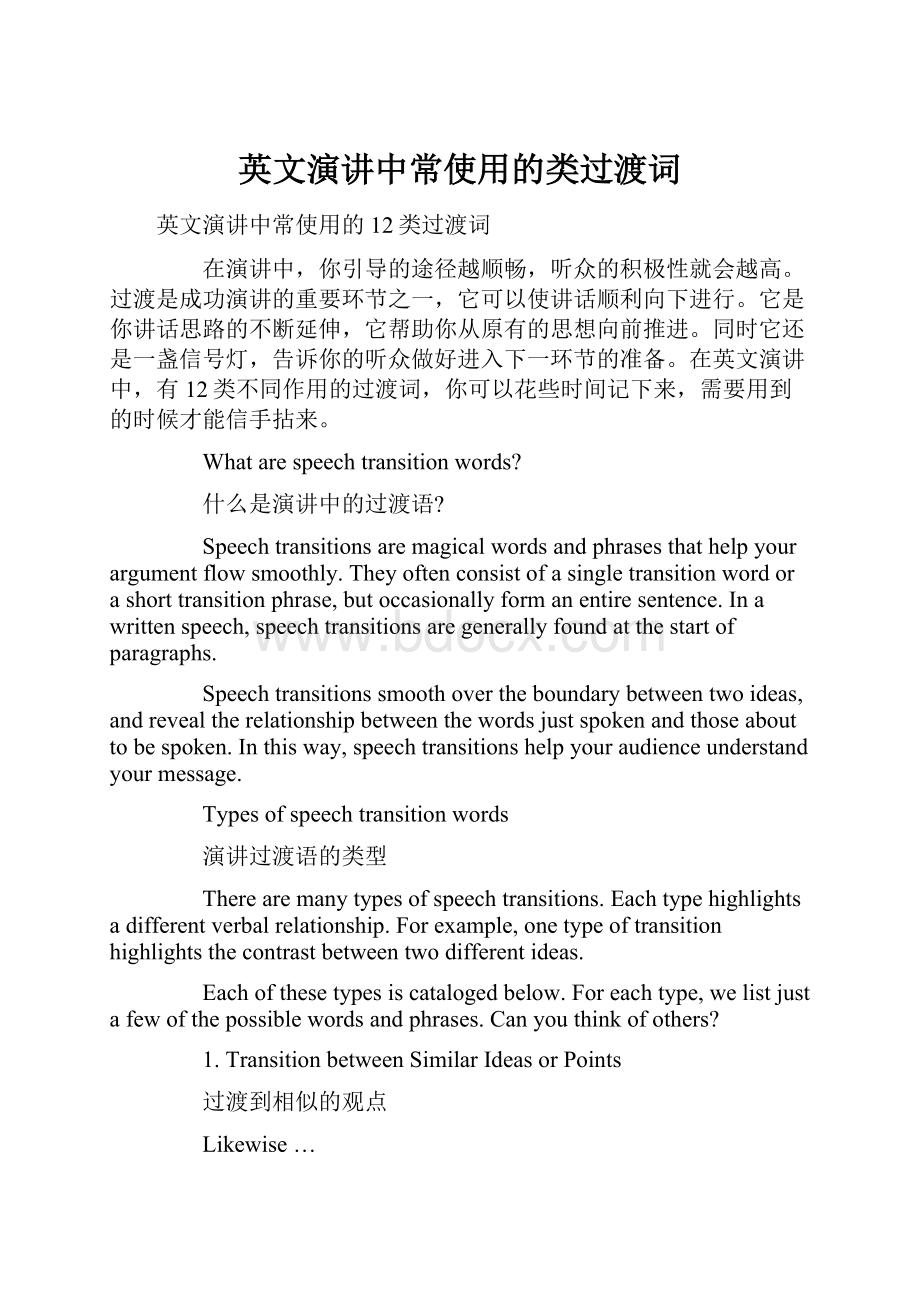英文演讲中常使用的类过渡词.docx
《英文演讲中常使用的类过渡词.docx》由会员分享,可在线阅读,更多相关《英文演讲中常使用的类过渡词.docx(11页珍藏版)》请在冰豆网上搜索。

英文演讲中常使用的类过渡词
英文演讲中常使用的12类过渡词
在演讲中,你引导的途径越顺畅,听众的积极性就会越高。
过渡是成功演讲的重要环节之一,它可以使讲话顺利向下进行。
它是你讲话思路的不断延伸,它帮助你从原有的思想向前推进。
同时它还是一盏信号灯,告诉你的听众做好进入下一环节的准备。
在英文演讲中,有12类不同作用的过渡词,你可以花些时间记下来,需要用到的时候才能信手拈来。
Whatarespeechtransitionwords?
什么是演讲中的过渡语?
Speechtransitionsaremagicalwordsandphrasesthathelpyourargumentflowsmoothly.Theyoftenconsistofasingletransitionwordorashorttransitionphrase,butoccasionallyformanentiresentence.Inawrittenspeech,speechtransitionsaregenerallyfoundatthestartofparagraphs.
Speechtransitionssmoothovertheboundarybetweentwoideas,andrevealtherelationshipbetweenthewordsjustspokenandthoseabouttobespoken.Inthisway,speechtransitionshelpyouraudienceunderstandyourmessage.
Typesofspeechtransitionwords
演讲过渡语的类型
Therearemanytypesofspeechtransitions.Eachtypehighlightsadifferentverbalrelationship.Forexample,onetypeoftransitionhighlightsthecontrastbetweentwodifferentideas.
Eachofthesetypesiscatalogedbelow.Foreachtype,welistjustafewofthepossiblewordsandphrases.Canyouthinkofothers?
1.TransitionbetweenSimilarIdeasorPoints
过渡到相似的观点
Likewise…
Similarly…
Thisisjustlike…
Inasimilarway…
Weseethesamethingifweconsider…
“Speechtransitionssmoothovertheboundarybetweentwoideas,andrevealtherelationshipbetweenthewordsjustspokenandthoseabouttobespoken.”
2.TransitionbetweenContrastingIdeasorPoints
过渡到相反的观点
However…
Conversely…
Onthecontrary…
Ontheotherside…
Ontheotherhand…
Ifweflipthataround…
Yet,wecannotignore…
Theopposingargument…
Ifweexaminetheoppositeside,wesee…
3.Transitiontoelaborateuponanidea
转入对观点的详细解释说明
Also…
Moreover…
Inaddition…
Furthermore…
Inotherwords…
Notonlythat,but…
4.TransitiontoNumberedIdeasorPoints(orProcessSteps)
引出多个观点
First…(Thefirststepis…)
Second…(Thesecondstepis…)
Third…(Thethirdstepis…)
Last…(Thelaststepis…)
5.TransitiontoshowCause-EffectRelationship
因果关系转折
Therefore…
Asaresult…
Consequently…
Forthatreason…
Thisisimportantbecause…
6.TransitiontoaSupportingExample
转入支撑观点的事例
Forinstance…
Forexample…
Asanexample…
Toillustratethis…
What’sanexampleofthis?
…
Butdoesthishappeninreallife?
Yes…
7.TransitiontoaSupportingDemonstration
转入支撑观点的演示、展示
Nowthatwe’vecoveredthetheory,let’sseeitinaction…
Toreinforcewhatwe’velearned,let’sseeademonstration…
I’vepreparedademonstrationtoshowhowthisworks.
Let’sseeademonstrationwhichapplieswhatwe’velearned.
“Whenexecutedwell,speechtransitionshelpmakeaspeechunderstandable.
Whenexecutedpoorly,speechtransitionscanobscuremeaningandfrustrateaudiences.”
8.TransitiontoaSupportingQuotation
转入支撑观点的引用语
Xsaid:
…
In1968,Xsaid:
…
ThisideawasexpressedclearlybyXwhosaid…
9.TransitionfromIntroductionintoSpeechBody
从引入语过渡到演讲正题
Let’sbegin…
Togetstarted,let’sexamine…
Let’sgetstartedtalkingabout…
Nowthatwe’vegivenanoverview,let’sstartwith…
10.TransitionfromSpeechBodyintoConclusion
从演讲正文过渡到结束语
Forashortspeech,youmightconcludewithasinglestatement:
Inshort…
Insummary…
Inconclusion…
Inalongerpresentation,yourconclusionmightincludeareviewofathekeypoints:
Let’ssummarizethekeylessons…
Let’srecapwhatwe’vecoveredtoday…
11.TransitiontoAnotherSpeaker
一个讲者过渡到另一个讲者
Inateampresentation,itisnecessarytotransfercontrolbetweenspeakers.
Theabruptwaytodothisistosimplyhaveonepersonstoptalking,andthenhavetheotherpersonstarttalking.Itismuchsmoother,however,topasstheverbalbatontothenextspeaker(X):
Totalkaboutournexttopic,wehaveX…
I’llpassthemicrophonetoXwhowilldescribe…
Toguideusthroughademonstrationofthis,wehaveX…
12.TransitionBacktoanEarlierPoint
转回之前的观点
Therearemanyoccasionswhenyouneedtojumpbacktoanearlierideatoaddadditionalinformation.e.g.afterabreak,followinganexercise,orreturningfromanunplannedinterruption
Let’sreturn…
Let’srevisit…
Let’sgobackto…
WeintroducedXearlier;let’sexplorethatfurthernow.
八类英语表达过渡词整理
【网络综合-英语口语】
一.文章及段落起始的过渡词语
1.tobeginwith首先
2.generallyspeaking总体上讲
3.firstofall第一,首先
4.inthefirstplace首先?
二.文章及段落结尾常用的过渡词语
1.therefore,thus因此
2.inconclusion最后
3.inbrief,inanutshell简言之
4.tosumup总而言之
5.inaword总之
三.常见的表示先后次序的过渡词语
1.first,second第一,第二
2.next其次,然后
3.eventually最后,最终
4.sincethen自此之后
5.afterward以后,随后
6.meanwhile同时
7.therefore因而
8.immediately立刻
四.常见的表示因果关系的过渡词语
1.accordingly于是
2.forthisreason由于这个原因
3.asaresult结果
4.inthisway这样
5.consequently结果,因此
6.so所以
7.dueto=owingto由于
8.becauseof因为
五.常用比较和对比的过渡词语
1.incontrastwith...与之相比
2.similarly同样
3.whereas然而
4.onthecontrary相反
5.differentfrom...与...不同
6.likewise同样
7.equallyimportant同样重要
8.ontheotherhand另一方面
六.常用表示举例的过渡词语
1.acaseinpoint恰当的例子
2.forexample举例
3.namely=thatis这就是说
4.forinstance举例
七.有关描写图表的过渡词语
1.duringthistime/theperiod在此期间
paredwith与...相比较
3.apartfrom..除了...之外
4.fromtheabovetable/chart/graph根据上图所示
八.常用表示强调的过渡词语
1.furthermore此外
2.moreover而且
3.besides此外
4.infact实际上
5.also而且,也
6.indeed的确
7.again另外,还
8.inparticular尤其,特别
雅思口语必备15种过渡词
雅思口语有四个评分标准:
Fluency&Coherence(流利度与连贯性),GrammaticalRange&Accuracy(语法广度及准确度),LexicalResources(词汇范围和准确度)和Pronunciation(发音)。
根据笔者观察,学生们往往对如何提升流利度与连贯性不知所措,即便在家里把准备好的材料背的滚瓜烂熟,到了考场也常由于紧张或者有明显背诵的痕迹,取得一个非常糟糕的分数。
虽然在一个较短的时间内大幅提升自己语言的连贯与流利不是件容易的事,但我们却可以通过口语中的一些过渡词,帮助自己消除紧张情绪。
更重要的是,善于运用口语中的过渡词,可以大大消除背诵痕迹,让自己的语言变得更加自然,更具有逻辑性。
在雅思口语中,有15种过渡词使用的频率极高,可以帮助大家迅速提升口语交流的流利度与连贯性。
1.Addition(递进)
moreover,whatismore,furthermore,,letalone,additionally,nottomention(this),besides(this),inaddition(tothis)
真题链接:
Q:
Doyouoftenusethedictionary?
A:
Ioftenrefertoadictionaryforsomenewwords.Additionally,browsingthedictionarycanalsoenlargemyvocabularyandknowledge.
2.Reference(引用)
considering(this),regarding(this),asfor(this),concerning(this),onthesubjectof(this)
真题链接:
Q:
Istimeimportant?
A:
Well,speakingabouttheimportanceoftime,therearealotofoldsayings,like‘Timewaitsfornoman.’;‘Timenevercomesbackwhenitisgone.’
3.Example(举例)
suchas,particularly,especially,forexample,like,inparticular,foronething,notably
真题链接:
Q:
Arethereanycoloursthathaveaspecialmeaninginyourcountry?
A:
Yea,differentcoloursstandsfordifferentmeanings.Forexample,thewhitecolourrepresentspurityanddignity,andtheredcolourisforjoyandcelebration.
真题链接:
A:
Whatkindsofmuseumdoyoulike?
Q:
Well,Iamreallyfondofsomenewmuseumswithdifferentmovies,particularly,the3Dand4Dmovieswhichgivemeavividpictureofhistoryandart.
4.Similarity(相似)
similarly,inthesameway,equally,likewise,aswellas
真题链接:
Q:
Doyouthinkadvertisementcanhelpproductstobesold?
A:
Advertisementscanhelppeopletohaveabetterunderstandingaboutproducts,inthesameway,advertisementsusuallytellpeopletheuniquefunctionsoftheproducts.
5.Clarification(澄清)
thatis(tosay),Imean,(to)put(it)anotherway,inotherwords,namely,specifically
真题链接:
Q:
Whathouseworkdoyouleastlikedoing?
A:
Washingdisheshasalwaysbeenapethate(特别讨厌的东西)ofmine.Specifically,IfeeldisgustedwhenIputmyhandsinthedirtywaterorwipeallthefoodoffthedishes.
6.Conflict(转折)
but,while,ontheotherhand,however,whereas,incontrast,conversely,still,instead
真题链接:
A:
DoChinesepeoplelovebirds?
Why?
Q:
Isupposeso,especiallyelderlypeople.Theylovetowalkwiththeirbirdsintheparksorgardensinthemorning;ontheotherhand,Idon’tthinkyoungguysreallygetakickoutofbirds.
7.Emphasis(强调)
evenmore,aboveall,indeed,moreimportantly,besides
真题链接:
A:
DoyoulovestudyingEnglish?
Explainwhy.
Q:
Asanuniversallanguage,Englishenablesmetotravelaroundalotofcountriesintheworld.Moreimportantly,Imakealotofforeignfriendsandbecomemoreconfidentthanever.
8.Concession(让步)
butevenso,eventhough,though,although,despite(this),inspiteof(this),regardless(ofthis),
真题链接:
Q:
Doyouthinklandlineswouldbereplacedbycellphonesoneday?
A:
Well,cellphoneshavereceivedahugepopularityamongyoungpeople,butevenso,landlinesstillhaveitsirreplaceablestrongpoints.Landlineshavenoradiationandaremuchcheaperthancellphones.
9.Cause/Reason(原因)
since,as,inthat,forthe(simple)reasonthat,because(ofthefact),seeingthat,owingto(thefact),
dueto(thefactthat)
真题链接:
Q:
Doyouliketravelingbytrain?
A:
Yes,Iliketravelingbytrainduetothefactthatit’sveryconvenientandfast.Moreover,Ifindtakingtrainsaremuchsaferthantakingbuses.
10.Effect/Result(影响或结果)
consequently,hence,thus,because(ofthis),asaresult(ofthis),forthisreason,sothat,accordingly,asaconsequence,so,therefore
真题链接:
Q:
Howtoprotectthewildanimals?
A:
Ibelievethemostefficientwayistoenactlawsthatwillmakethehuntingofwildanimalsillegal;therefore,theequilibriumofecosystemcanbemaintained.